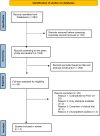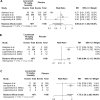The efficacy and safety of lecanemab 10 mg/kg biweekly compared to a placebo in patients with Alzheimer's disease: a systematic review and meta-analysis of randomized controlled trials
- PMID: 38565747
- PMCID: PMC11254984
- DOI: 10.1007/s10072-024-07477-w
The efficacy and safety of lecanemab 10 mg/kg biweekly compared to a placebo in patients with Alzheimer's disease: a systematic review and meta-analysis of randomized controlled trials
Abstract
Alzheimer's disease, prevalent in individuals aged 60 and above, constitutes most dementia cases and significantly impairs memory and cognitive functions. With global Alzheimer's cases projected to triple by 2050, there is a pressing need for effective interventions. Lecanemab, a monoclonal antibody targeting amyloid-beta plaques, shows promise in slowing Alzheimer's progression. Positive clinical trial results have instilled hope in patients, prompting ongoing research to advance understanding and intervention possibilities. To contribute to this knowledge base, we conducted a systematic review and meta-analysis, focusing on lecanemab's efficacy and safety at a dosage of 10 mg/kg. This comprehensive approach aimed to address gaps in the current literature, scrutinize research disparities, and guide future investigations. Applying strict inclusion/exclusion criteria, we assessed study details, participant information, and intervention specifics, using the Cochrane risk of bias tool for quality evaluation. Statistical analyses, conducted with R software, included risk ratios and mean differences, assessing heterogeneity and publication bias. The meta-analysis reveals a significant positive effect of lecanemab (10 mg/kg biweekly) on cognitive outcomes in Alzheimer's disease. Consistent reductions in ADCOMS, CDR-SB, and ADAS-cog14 scores across studies indicate drug efficacy with narrow confidence intervals and no significant heterogeneity. While TEAE shows no significant difference, heightened risks of ARIA-E and ARIA-H associated with lecanemab underscore the need for vigilant safety monitoring in clinical practice. Despite the drug efficacy, the study emphasizes a balanced assessment of benefits and potential risks associated with lecanemab, providing critical insights for clinicians evaluating its use in addressing cognitive impairment in individuals with Alzheimer's disease.
Keywords: Adverse events; Alzheimer’s disease; Amyloid-beta plaques; Lecanemab; Monoclonal antibody.
© 2024. The Author(s).
Conflict of interest statement
The authors declare no competing interests.
Figures





References
Publication types
MeSH terms
Substances
LinkOut - more resources
Full Text Sources
Medical

